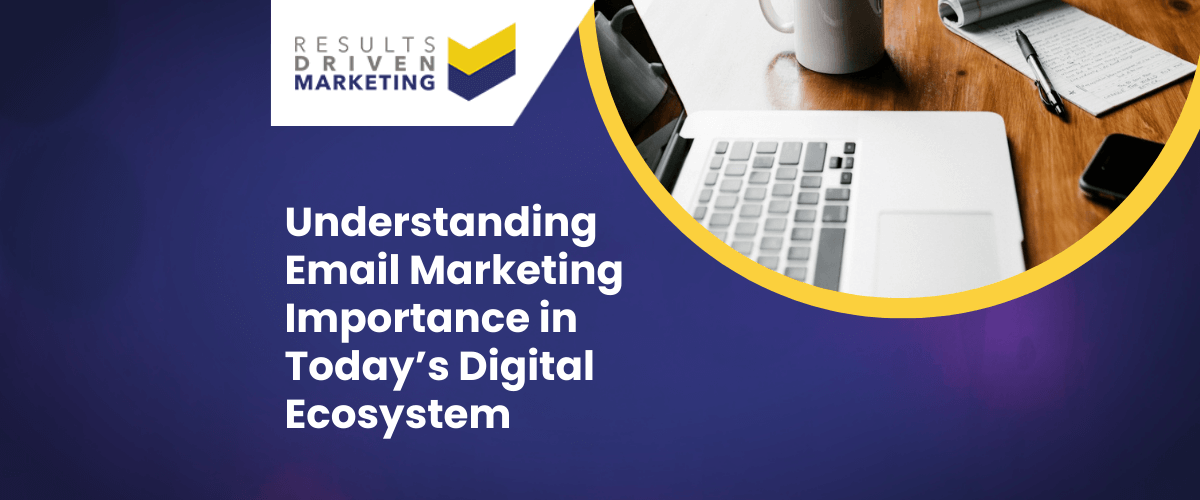
Understanding Email Marketing Importance in Today’s Digital Ecosystem
Understanding Email Marketing Importance in Today’s Digital Ecosystem
In an era dominated by digital innovations, marketing strategies have evolved significantly, making it crucial for businesses to leverage various online platforms to reach their target audiences effectively.
Amidst the dynamic digital marketing landscape, one method stands out for its robustness and proven success: email marketing. This channel is not just surviving; it is thriving, thanks to its exceptional ability to connect directly with customers.
Email marketing is often celebrated for its directness and personalisation capabilities, which allow businesses to engage with their audience in a uniquely intimate manner.
Unlike other digital marketing strategies that rely on algorithm-driven platforms, email marketing lets you control the distribution and ensures your message reaches the intended inboxes without the uncertainties of social media feeds.
This article dives deep into the significance of email marketing within the modern digital marketing framework. We will explore the enduring email marketing importance, why it remains an indispensable part of any successful digital marketing strategy, and how you can measure and maximise its effectiveness.
By understanding how to gauge the impact of email marketing, businesses can make informed decisions that drive growth and foster enduring customer relationships.
Table of contents:
Understanding Email Marketing Importance
Email marketing is a dynamic and direct digital strategy that enables businesses to send targeted messages to specific groups of customers or prospects.
Essentially, it involves the distribution of promotional content via electronic mail as a means of generating leads, building brand awareness, enhancing customer relationships, and driving sales.
This strategy is pivotal because it offers an unmatched level of personalisation and direct contact with the audience.
Over the years, the evolution of email marketing has been substantial, driven largely by advancements in technology. From simple text-based emails to rich HTML layouts, and now incorporating sophisticated elements like embedded videos and interactive content, email marketing tools have grown increasingly robust.
Automation and data analytics have further revolutionised this channel, allowing marketers to send highly customised messages based on user behaviour and preferences.
Here are some compelling statistics that underline the email marketing importance and its success rates:
- High ROI: For every dollar spent on email marketing, the average return on investment is about $42.
- Consumer Preference: A survey found that 60% of consumers prefer to receive promotional messages through email, compared to other digital channels.
- Engagement Rates: Emails have an average open rate of 21.3% across all industries, which significantly outpaces engagement on platforms like Facebook or Twitter.
Email Marketing Importance in a Digital Strategy
Email marketing does not operate in a vacuum. Rather, it complements and enhances other digital marketing channels like social media and search engine optimisation (SEO).
While social media excels at building brand presence and engaging with a broad audience, email marketing drives this engagement deeper, offering a direct line to nurture leads and convert them into loyal customers.
Similarly, SEO attracts visitors to a website, and email marketing can keep them coming back.
Personalisation and automation are two key factors in the ongoing relevance of email marketing. These tactics ensure that emails feel bespoke to each recipient, increasing the likelihood of engagement and conversion.
Automation tools allow marketers to send timely and relevant messages without manual intervention, ensuring that every subscriber receives content that is aligned with their individual needs and actions at scale.
By leveraging these capabilities, email marketing not only supports but significantly boosts the efficacy of digital marketing efforts, underlining its critical role in today’s digital age.
Measuring Email Marketing Importance
Understanding the impact of your email marketing efforts is crucial. To truly appreciate the email marketing importance, one must delve into the analytics that reflect its performance.
Here are key performance indicators (KPIs) and tools that are essential for gauging the success of email campaigns:
Key Performance Indicators (KPIs) to Track Email Marketing Importance
- Open Rate: The percentage of recipients who open an email. This metric helps gauge the initial appeal of your email’s subject line.
- Click-Through Rate (CTR): This measures how many people clicked on links within the email, an indicator of the content’s relevance and engagement.
- Conversion Rate: The percentage of email recipients who completed a desired action, such as making a purchase or signing up for a service.
- Bounce Rate: The rate at which your emails are rejected by the server or not delivered, which can indicate list health.
Tools and Methods for Tracking Email Marketing Success
- Email Marketing Platforms: Tools like Responder provide built-in analytics for tracking the performance of campaigns.
- Google Analytics: By setting up UTM parameters, you can track how email traffic behaves on your website, helping you understand the broader impact beyond initial clicks.
How to Analyse Email Marketing Data to Make Informed Business Decisions
- Collect Data: Regularly monitor and collect data from your email campaigns.
- Compare Against Benchmarks: Use industry benchmarks to set goals and expectations for your campaigns.
- Identify Trends: Look for patterns in the data that can inform future strategies, such as the best times to send emails or the most engaging content types.
- Test and Iterate: Continuously test different elements like subject lines, email layouts, and calls-to-action to refine your approach and improve outcomes.
Section 4: Best Practices for Maximising Email Marketing Efficacy
To maximize the email marketing importance in your digital strategy, adopting best practices is essential. Here’s how you can improve engagement and effectiveness:
Tips on Improving Email Open Rates and Click-Through Rates
- Craft Compelling Subject Lines: Use action-oriented language, curiosity-provoking phrases, or personalization to make your emails stand out in the inbox.
- Optimise Send Times: Test different times and days to find when your audience is most likely to open and engage with your emails.
- Use A/B Testing: Experiment with two variations to see what resonates best with your audience and use the insights to optimise future campaigns.
Strategies for Segmenting Email Lists and Personalising Content
- Segment Your Audience: Divide your email list based on demographics, behaviour, or purchase history to tailor your messaging more precisely.
- Personalise Your Messages: Go beyond using the recipient’s name; customise the content according to the user’s preferences and past interactions with your brand.
Latest Trends in Email Marketing
- Integration with AI: Use AI to optimize email campaign variables automatically, including personalization and send times.
- Responsive Design: Ensure your emails are mobile-friendly, as a significant portion of users access their email on mobile devices.
- Interactive Content: Incorporate elements like surveys, polls, and interactive images to increase engagement and make emails more interactive.
By implementing these practices, you can enhance the effectiveness of your email marketing campaigns and ensure they play a pivotal role in your broader digital marketing strategy. This approach not only underscores the email marketing importance but also drives tangible improvements in engagement and conversion rates.
Overcoming Challenges in Email Marketing
Despite the clear email marketing importance, several challenges can hinder its success. Understanding these pitfalls and knowing how to navigate them is crucial for any marketer.
Common Pitfalls and Challenges in Email Marketing Campaigns
- Low Engagement Rates: Sometimes, recipients do not open, read, or engage with the emails, which can be disheartening.
- Email Deliverability Issues: Emails that end up in the spam folder or aren’t delivered at all can significantly impact campaign effectiveness.
- List Decay and Churn: Email lists naturally degrade as people change their email addresses or opt out of email communications, which can decrease the reach of your campaigns.
Solutions and Strategies to Overcome These Challenges
- Improve Content Relevance: Ensure your content is highly relevant and engaging to your audience to boost open and click-through rates.
- Optimise Email Deliverability: Follow best practices for email marketing to avoid spam filters and improve deliverability, such as maintaining a clean email list and using authenticated domains.
- Regular List Maintenance: Periodically clean your email list to remove inactive subscribers and keep your engagement rates healthy.
Conclusion
Throughout this article, we’ve explored the enduring email marketing importance in today’s digital age, delving into how it integrates within broader digital marketing strategies, and the practical steps you can take to measure, optimise, and enhance its effectiveness.
We’ve highlighted the significance of keeping up with technological advancements and best practices in the industry, and how these efforts can lead to substantial benefits for your business.
As we wrap up, it’s important to remember that the landscape of digital marketing is ever-evolving, and staying at the forefront means continuously adapting and improving your strategies. Email marketing is a potent tool that, when used wisely, can significantly amplify your marketing efforts.
Call to Action
Are you ready to take your email marketing to the next level? Consider revisiting your current strategies using the insights and guidelines shared in this article. Don’t hesitate to experiment with new techniques, invest in learning more about email marketing trends, and continuously refine your approach to stay ahead of the curve. With a solid understanding of email marketing importance and a commitment to best practices, you’re well on your way to achieving greater success in your digital marketing endeavours.
Who Are We?
Dedicated to lead generation, Results Driven Marketing provides myriad services SMEs can trust to deliver results.
Our marketing lists are guaranteed accurate to industry high standards, and GDPR compliant and our experience team means that if you are looking to buy data, they make them totally bespoke and highly relevant whether you are looking for email lists, direct mailing lists , international data or telemarketing lists
Our email marketing software is highly rated. Responder provides the automation tools you need to put your marketing on autopilot.
We also supply email marketing solutions with our email marketing platform.
Have a look a what our happy clients have to say about us on our testimonials page
Call us today on 0191 406 6399 to discuss your specific needs.
Results Driven Marketing
info@rdmarketing.co.uk
Contact Us
0191 406 6399





